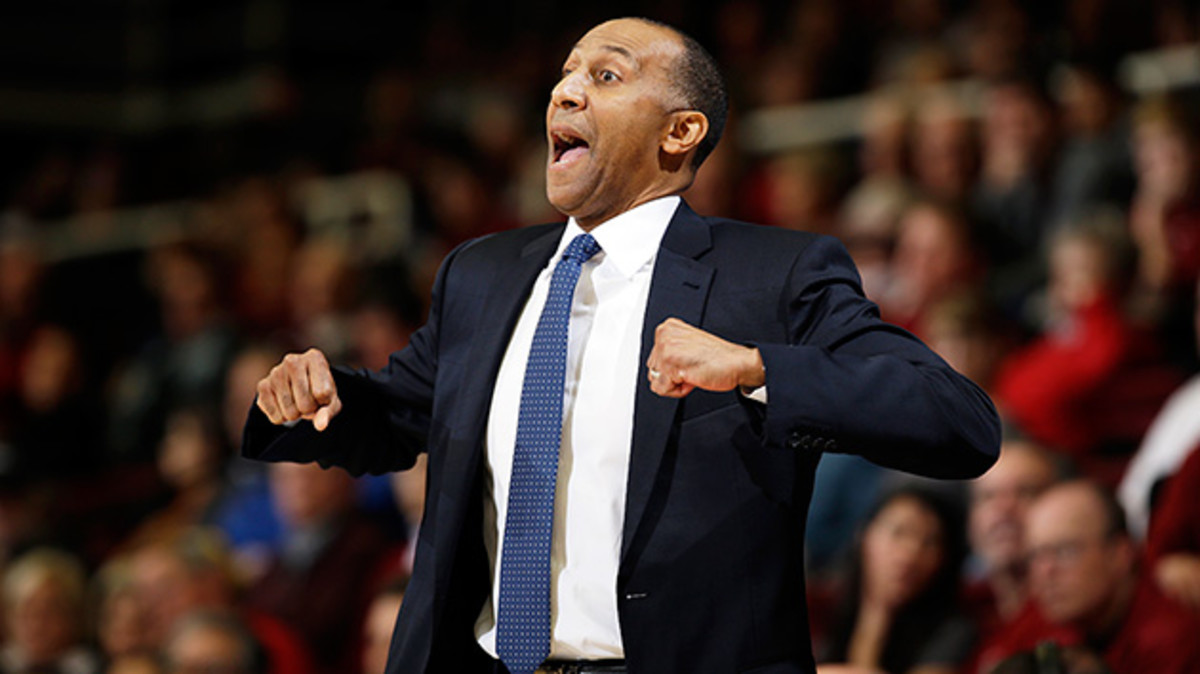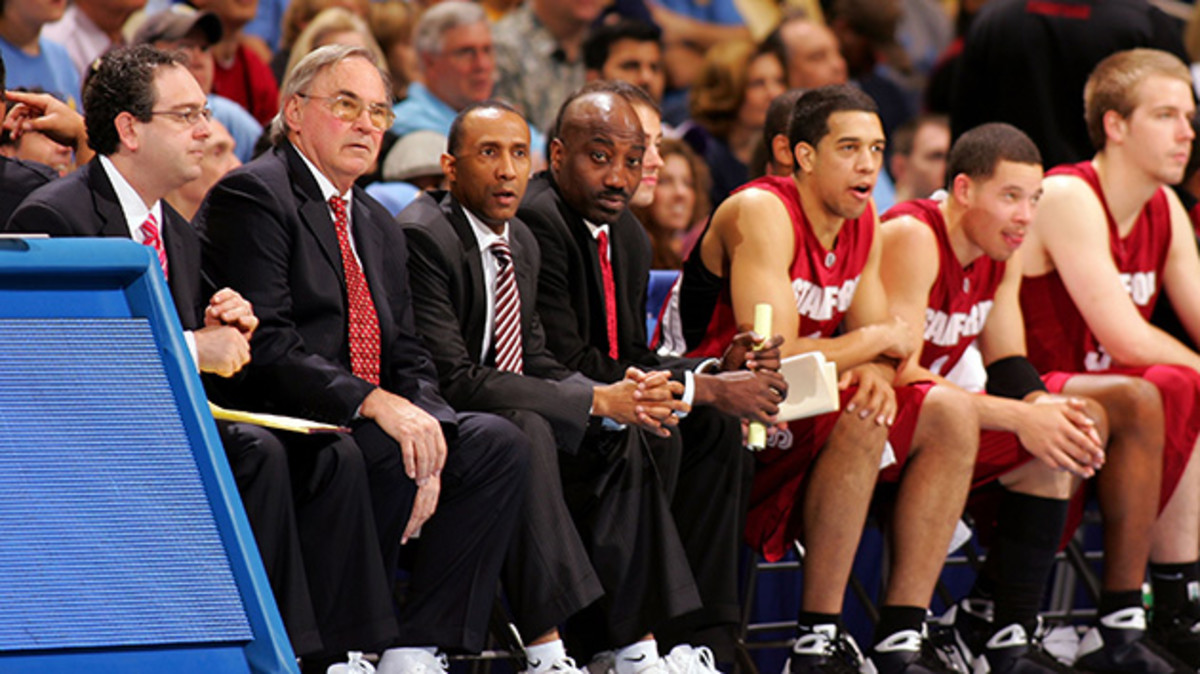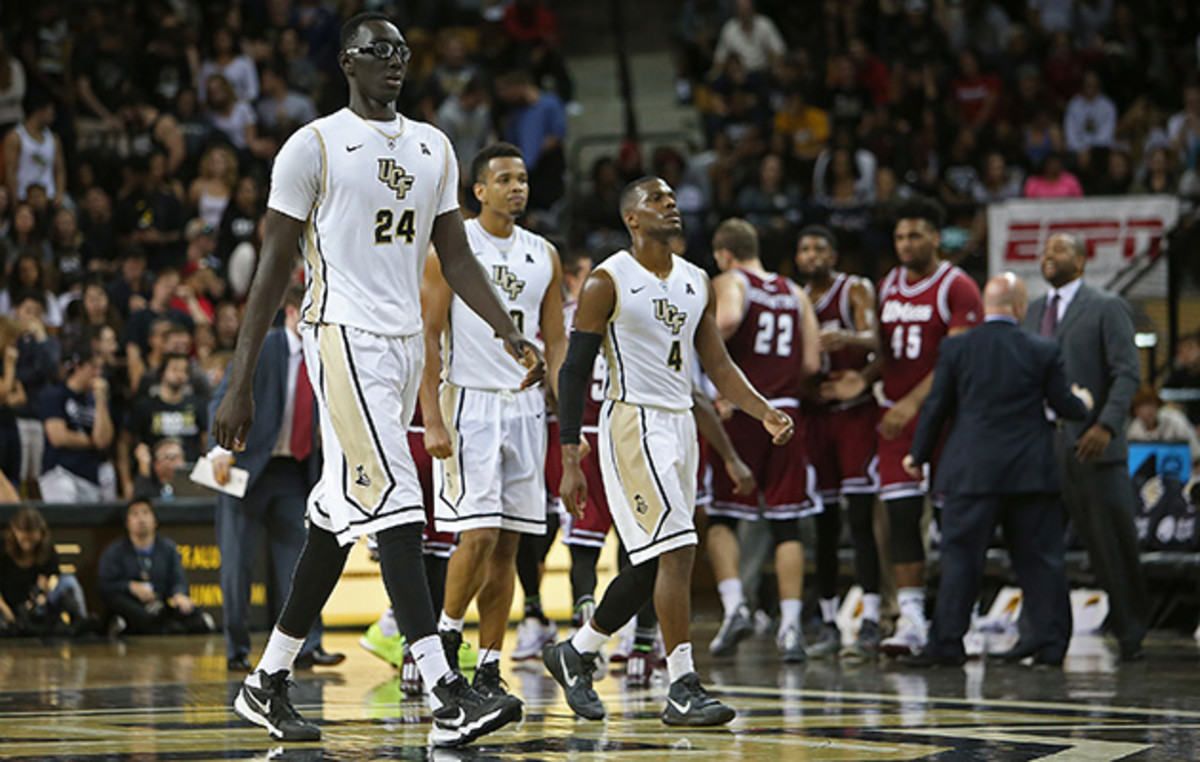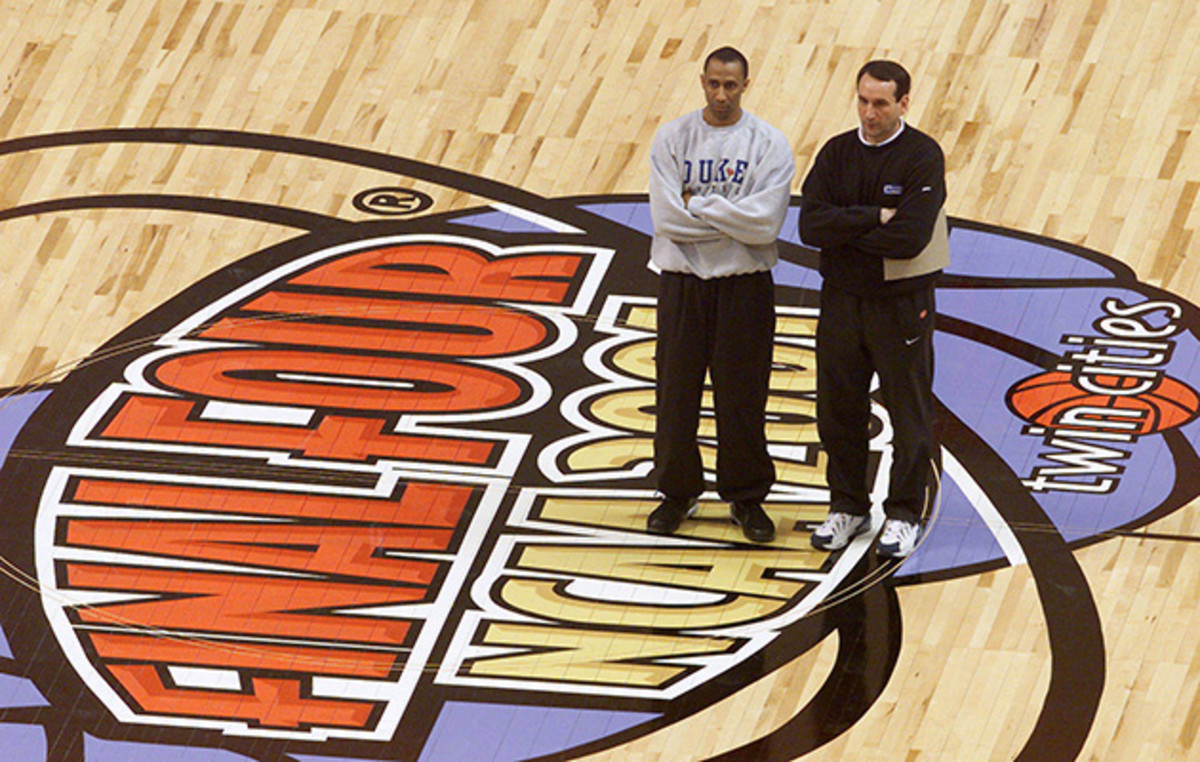Johnny Dawkins Q&A: New UCF coach talks Stanford, Tacko Fall & more

Get all of David Gardner’s columns as soon as they’re published. Download the new Sports Illustrated app (iOS or Android) and personalize your experience by following your favorite teams and SI writers.
With the 2016 college basketball coaching carousel nearing its conclusion, SI.com is checking in with all the major hires about their new gigs. These Q&As will be posted periodically throughout April and May. First up is Johnny Dawkins, who was fired by Stanford on March 14 after eight seasons with the Cardinal and hired by Central Florida eight days later.
Sports Illustrated: Where are you in the moving process? You were one of the first coaches hired. Do you have a home yet?
Johnny Dawkins: I may have had an early start, but I still don’t have a home yet. I’m living out of a hotel. But the transition is going well. I’ve had the chance to spend some quality time with our players and to hire staff. Those things are first and foremost on my list right now.
SI: So you’d rather stick it out in the hotel and make sure the team is in good shape first?
JD: Absolutely. We take care of our players here. And I wanted them to get to know me, and vice versa. And it’s important to start trying to find staff that reflect the values and principles that I have and that I want to instill in this institution.
SI: When it comes to house-hunting, do you have a say in that matter, or does the final decision go to [your wife] Tracy and the kids?
JD: (Laughs.) I would like to say me, but I’m lying. She gets the final say, of course, in all those matters. She’s much wiser than me with those decisions.
The 2016 Effy Awards: Chris Beard, Jay Wright among coaching winners
SI: What was the week like as you transitioned and were in between jobs after you left Stanford?
JD: You know, I hadn’t been in that situation in a long time, so it was a week of trying to figure out what direction we wanted to go in. My family and I were talking. We sat back and wanted to see what would come our way. And of course, I ended up doing some fun things. I ended up doing the NCAA [tournament] games one of the weekends. I was there for a day to cover games [for CBS Sports and Turner]. I thought that was fun. I was just seeing what was available, what did I find attractive. That’s how I spent that time.
SI: Were you considering jobs outside of coaching, like going into the media?
JD: I don’t think I was really considering what I’d do. I love this. I love mentoring young people. I love working with student-athletes. So I know this is for me. By the same token, to try something different for a day was fun. It was a fun experience, but I know I love coaching. I love teaching. I love being with young people, in the room, working with them, trying to help them fulfill their dreams. I knew I was in the right profession.
SI: Was there a thought about taking a year off?
JD: Like I said, when it happened, I really didn’t think about how fast I would be coaching again. I knew I wanted to, and I knew if the right opportunity came along I’d be excited about it. And fortunately, it did. That’s kind of how that transpired.

SI: When you got the phone call from [UCF athletic director] Danny White, where were you and were you surprised that UCF was calling?
JD: You know, you just don’t know what’s going to happen. You receive a phone call from a person who says they have an interest in you and want to interview you for the position. I was excited. I knew a little about UCF, and I spent some time learning a little bit more about it. And I learned about how promising this institution is in a lot of areas. What [UCF president] Dr. [John] Hitt has done has been phenomenal. As you look at the history of this institution, what he’s done and what’s been done over the last several decades has been—I don’t think many universities can boast that type of success over that period of time. All those things got me really fired up about the opportunity.
SI: Did you know Danny at all? You left for Stanford around the time that Danny's father, Kevin, took over as the AD at Duke.
JD: That was kind of the timeline. It was around the same time. Of course, I know Kevin a little. I wasn’t there to work under him, so I didn’t get the chance to know him well. But we’ve crossed paths a few times in our profession. And the same with Danny. We’ve crossed paths on a few occasions. I hadn’t known him very well, but that’s a great family. I think their accomplishments speak for themselves.
SI: It’s an interesting spot for Danny. His brother Mike, is the head coach at Florida. So he had to hire someone who would compete with his brother for in-state recruits. Have you tapped into that sibling rivalry at all?
JD: (Laughs.) No I haven’t tapped into that. I haven’t asked those kind of questions at all from them. I do know this—you don’t get to be in this profession and accomplish what they’ve accomplished without being very, very competitive young men.
SI: In a larger sense, what’s your strategy for competing for recruits in Florida? You have Mike at Florida, Jim Larrañaga at Miami, Leonard Hamilton has drawn some great recruits at Florida State. You’ve been on the road now talking to people, what’s been the strategy?
JD: I think it’s important to talk about the things that are very positive that are going on here at UCF. I think it’s more about us than what’s going on at other institutions. And that’s how we recruit, and that’s how we coach. We never really discuss other institutions. It’s all about what we have to offer here, and what we have to offer here is amazing.
These student-athletes will have meaningful opportunities to grow in every facet. Off the court, the amount of majors and things that they can be interested in are phenomenal. As far as basketball, you talk about playing in the American Athletic Conference, which is one of the best conferences in the country. You look at the coaches that are in this conference and the teams that are in this conference, and I think it speaks for itself. I think these are the things we can talk to a young student-athlete about. It’s his overall experience academically, and it’s his basketball experience in our conference.
You look at where we’re located. We all are Florida schools, but this is one of the best places to live in the world. And we have a wonderful institution here of higher learning. There are so many wonderful things for student-athletes to wrap their arms around.

SI: Does that attitude of only talking about yourselves and not other schools go back to your time at Duke?
JD: I think it’s overall what I believe in. I don’t believe in negative recruiting. I don’t have any time for that. I think a sign of strength is to be able to talk about what you can offer and what you can do for a young student-athlete, what your program can bring to the table. So I just don’t believe in that type of recruiting, and I never have.
SI: Is there a difference in how you approach recruiting in Florida vs. the West Coast at Stanford. You’re a well-known guy, but is there a difference in school recognition?
The 2016 Effy Awards: West Virginia, Syracuse win defensive honors
JD: Well of course Stanford’s brand is something that’s been built over a century. Our brand is something that started in 1963. So we’re playing some catch-up in that regard. But as I said to you earlier, the pace at which we’ve gained traction and moved forward has been phenomenal. That’s what excited me about being here. It’s really blossoming right before our eyes. And if you take a look, you’ll see it too. And just to be a part of a place where you see the brand becoming recognizable and you see the potential of our university and our athletic program, you see the potential that we can capture now. I’m excited to be a part of that next step.
SI: The past three seasons the Knights have gone 12-18, 12-18 and 13-18, respectively. How do you instill a winning culture?
JD: Well it’s important for our young people to know that they have a chance to win when they come here, and to win big. So, one, I think is that belief that we can accomplish it. And two, there’s no shortcut to it. You have to work. You have to get after it. You have to do that to give yourself a chance. And that’s what we’re going to be about—we’re going to be a blue-collar, hard-hat wearing team. We have to get out there and want it more and be willing to work for it.
When you take that approach, you start to make the improvements necessary to be very competitive. And that’s what we want to do. We want our young people to have a very fun experience in that process. I want it to be a fun experience knowing that winning is fun, and that’s what it’s about.

SI: What do you see when you look at your roster?
JD: I think it has a lot of potential. We have to turn that potential into accomplishments. I think a young man like [7'6" freshman center] Tacko [Fall] choosing UCF says a lot about us. He could have chosen to play anywhere in the country, and he chose UCF, and that says a lot about him too. And you know, the thing about Tacko—he’s also an engineering major. He’s getting a great education here while playing basketball. He’s kind of the poster child of what we’re talking about.
He’s a young man who has all the potential in the world to be drafted as high in the future as he wants to be. He’s also maximizing his education here. I’ve had a lot of fun getting to know him.
SI: Have you thought about how you’ll coach him? Not a lot of people have experience with his extreme height.
JD: (Laughs.) You know, it doesn’t knock me back like it maybe would other people. I was fortunate. Two of my NBA teammates were 7'6" and 7'7", respectively, in Shawn Bradley and Manute Bol. I’ve been on the floor with guys who were 7-and-a-half-feet tall on a number of occasions. So when I walk into the gym, it’s not anything that shocks me. I think that gives me a little bit of an advantage in working with him and in understanding how a guy that size thinks and plays.
The 2016 Effy Awards: Michigan State, Villanova win offensive honors
SI: Have you considered bringing those guys in to mentor him?
JD: That’s not something that we’ve discussed. But it would be good to utilize the resources that we have. And it would probably be good for Tacko to see someone else that size who has been successful.
SI: And who can give them tips on how to travel comfortably on airplanes.
JD: Absolutely. It’s a must that Tacko gets the exit row. (Laughs.)
SI: The AAC, which you talked about before, is a strong conference. What do you see as the main differences between competing in the Pac-12 and the AAC?
JD: I think both conferences have terrific coaches. I think both offer a style of play that can be really fun. But I think the American, when you mentions guys like [UConn coach] Kevin Ollie, [SMU coach] Larry Brown, [Tulane] coach [Mike] Dunleavy [Sr.] ... we can go on and on and on. I can mention every coach in this conference and their accomplishments, and it just screams that this is going to be a very, very competitive conference. I think the talent that we’ve attracted in this conference speaks for itself. Everyone in the nation wanted Tacko, but he chose to come here.
SI: You’ve talked about how quickly UCF has built itself up as an institution. How quickly can you build this basketball team up?
JD: Well we want to head in the right direction, and that’s up. You have to lay a solid foundation first and foremost. It’s not going to happen overnight. You have to take that approach and work diligently every day to make that happen. We want to go forward with the confidence that we can build on top of this. I don’t give it years—Year 1, Year 2—we want to be great every year. I want our student-athletes to know that the possibility of success is there for them always.

SI: It would be fitting for you to build a program up from the ground up considering you a key player in the foundational recruiting class of 1982 that your mentor, Mike Krzyzewski, used to build his program at Duke.
JD: He has done an amazing job. You look at his accomplishments over the years. It’s not just that he’s had success and won national championships, it’s the consistent amount of success that he’s had. A lot of people have won something in the tournament here or there, but his body of work over three decades is phenomenal. He’s one of the best coaches of all time in any sport.
SI: How many more years do you think he has left?
JD: What I always tell him is: As many years as you want. His great passion is our sport. He’s a great mentor and my comment is the same all the time: When you have the ability to impact lives like that, do it as long as you can. That’s what I always say. I say go for another decade. I just can’t imagine our sport, and I can’t imagine Duke, without him. Maybe I’m selfish because I’ve worked for him and I’ve played for him—I just can’t imagine our game without him. It doesn’t seem right.
UNC men’s program appears off the hook, but questions linger
SI: As long as he’s pulling in guys like Harry Giles and Jayson Tatum, I think he’ll find some reasons to keep coaching.
JD: (Laughs.) Those kids—that’s a great opportunity for those young men. They’ll be touched in ways they probably can’t imagine for the rest of their lives.
SI: Finally, any trips to Disney World yet?
JD: (Laughs.) No, we haven’t had any time for any trips yet. But it is also in Orlando. Maybe we’ll get through there before long. Everyone around the world wants to visit us here.
SI: You know, everybody jokes about Florida as a place to retire, but it seems like you’ve really found a youthful renewal through the program down there.
JD: You won’t hear retirement come out of my mouth. That’s the furthest thing from my mind.
SI: Well you can’t let Coach K outlast you, that’s for sure.
JD: (Laughs.) Well you know, I’ve never thought about it that way. But I’m going to try my best to stay in the game as long as I can. I’m pretty sure I’ll outlast him.
